
FAUSTO GOMEZ OP
faustogomezb@yahoo.com
      We read the newspapers and journals of public interest; we watch the news on television or movies; we navigate on the web…, what do we read and see very often? Issues directly connected with biotechnology and biomedicine, and with bioethics and human life. Some current bioethical concerns are in vitro fertilization and embryo transfer, organ transplant and donation, surrogate motherhood, experimentation with embryonic stem cells, abortion, euthanasia and physician assisted suicide, gene therapy, drug testing, regenerative medicine, etc.
      Facing these issues, the scientific question is, can it be done? The ethical question is, what can be done, should it be done? Is it right?  In our world dominated by science and technology, is not bioethics truly important and relevant for all human beings today?
      MEANING OF BIOETHICS
      The word bioethics was coined in 1970 by oncologist Van R. Potter in his trail blazing article The Science of Survival. Potter wanted this new science of bioethics to be a bridge to the growing separation between the scientific culture and the humanist culture. Since then the meaning of bioethics has been enriched by positive contributions from other sciences, in particular the social sciences, ecology philosophy, and theology.
      Etymologically, bioethics (bios: life; ethics: ethics) means life-ethics, or ethics of the life sciences. It refers mainly not to a technical science (biology), but to a normative science (ethics) that studies moral principles, values, norms and practices concerning biomedical interventions on human life. Because bioethics is the ethics of human life from the moment of conception to natural death, and in-between life and death, bioethics is an important normative life science for all persons.
      Substantially, bioethics is not “a fundamentally new ethics, but the application of ethics and its basic principles to the new possibilities open up to us by modern biology and biotechnology with regard to human life†(Josef Fuchs). And yet, bioethics, while focusing on healthcare ethics, goes beyond it to encompass social, business, and ecological ethics.
      Bioethics may be divided into micro-ethics and macro-ethics. Micro-ethics refers to the analysis and care of personal cases (of illnesses of individual persons). Macro-ethics studies the impact of biomedical decisions on society, public policy on health for all, and on justice and solidarity in healthcare.
      CHRISTIAN PERSPECTIVE
      Bioethics today is usually presented as secular ethics or ethics from the perspective of reason. Humans ground moral decision-making on human dignity and rights, which are equal in all human persons, beginning with the fundamental right to life.
      There is, moreover, religious ethics, which speak of the value of life not only from the perspective of reason – radically of natural law, or the law of being human -,  but mainly from the vision of faith in God, and, in the case of Christians, in the Son of God Jesus Christ. Theological bioethics confirms the fundamental ethical principles and values developed by reason, and provides a deep meaning to life, suffering and death. Christians and many men and women of good will defend and promote a consistent-life-ethic and a dignified life for all.
      For Christians, the radical sources of their faith-vision are the Sacred Scriptures and Tradition, which are explained by the magisterium or official teaching of the Church. An easily available written summary of the Church’s doctrine is found in the Catechism of the Catholic Church (1992, 1997), more concretely in its third part on general Christian ethics and the commandments. There is a pace-setting encyclical on bioethical problems and concerns: Evangelium Vitae, EV, or The Gospel of Life (1995) of St. John Paul II. There are other significant and more in-depth documents on bioethics and life from the Vatican Congregation for the Doctrine of Faith.
      IMPORTANCE OF BIOETHICS FOR ALL
      Bioethics is important for everyone. We are all potential patients in need of a doctor. Bioethics helps us know better our human dignity, which ought to be respected by all, and our human rights, including the right to health care, to proper healthcare information, the right to refuse useless treatment, and the right to privacy and confidentiality.
      Bioethics is important, in particular, for the family. The central concern of bioethics is human life, a great value for all human beings, in particular the family, which is the community of life and love. For believers in Jesus and for many other peoples, the family is founded on marriage and is the basic cell and foundation of society. The Christian family is the sanctuary of life, and is asked to proclaim, celebrate, and serve life (EV 92). The family values life and contributes immensely to the promotion of a culture of life. The members of the family are tasked to be “people of life and people for life†(St. John Paul II).
      The continually growing relevance of bioethics in our time is attested by the fact that bioethics education is today an important part of integral education. It is a subject in the health sciences, in the humanities, in philosophy, and in theology. Certainly, “bioethics interests everyone concerned with the interface of technology, nature, and human nature; as a result, it has been a highly successful addition to educational curricula†(William Callahan).
      Bioethics is necessary for physicians, nurses, pharmacists, and other healthcare professionals, who have to know and practice the bioethical dimension of a scientific and humane medicine. “Clinical analysis and ethical analysis in health work are inextricably linked… No doctor can escape the influence of ethical theory and practice†(Charles M. Culver). Bioethics in human and Christian perspective is also necessary for Christian healthcare workers. Their vocation is a ministry in the Church’s healing mission (cf. New Charter of Healthcare Workers, 2017, by Vatican Dicastery for the Promotion of Integral Human Development).
      Bioethics is also necessary for scientists, researchers and legislators. Science is not ethically neutral, neither laws. Like any human activity, scientific research and human laws have a moral dimension. The scientist, the lawmaker are ethical persons, professionals guided by an ethical code that respects every human person and his/her dignity as expressed in human rights and basic laws. The human person is the central criterion of any ethics and of the ethical dimension of science, biology, biomedicine, and laws. Kant wrote: “Act in such a way that you always take humanity in yourself as well as in every person as end and never as means.â€Â A radical principle of ethics – and bioethics is this: The human person ought to be respected always, and never used as means. For the Christian, every human being is a creature and a child of God and therefore his/her life is sacred.
      Bioethics is also important for teachers. “All teachers are to be inspired by academic ideals and by the principles of an authentic human life†(Ex Corde Ecclesiae). Teachers are to be competent not only in their own subject matter, but also knowledgeable concerning the basic questions of life and its meaning which are part of the extracurricular questions of our students. I remember these words of Saint Augustine: “I learned not from those who taught me, but from those who talked with me, as I try to pour into their ears the way I felt about things.â€
      BIOETHICS: INVITATION TO LOVE
      Bioethics is important for everyone in another sense. As custodians of our health, bioethics may help us be healthy – and ethical. Mens sana in corpore sano – a sound mind in a sound body: a temperate life style, a hopeful and joyful attitude, a virtuous living. In Christian perspective, the following of Christ is the healthiest way of living!
      The goal of bioethics – of any ethics – is not merely to know but mainly to do: “To know and not to do is not yet to know†(Buddhist Proverb). To do what? To do good; radically, to be good. Theologian Peter Kreeft asks himself: What is the purpose of ethics? To answer:  “To be good, that is, virtuous,†– to love! When all is said and done, what really matters in ethics, bioethics, theological ethics – in life, really – is love: love is the value and the virtue of life! Authentic love respects truth. God is Love and Truth. True love is the best defense and promotion of human life consistently. Indeed, “to be is to love†(E. Mounier).
(Published in O Clarim: May 19, 2017)
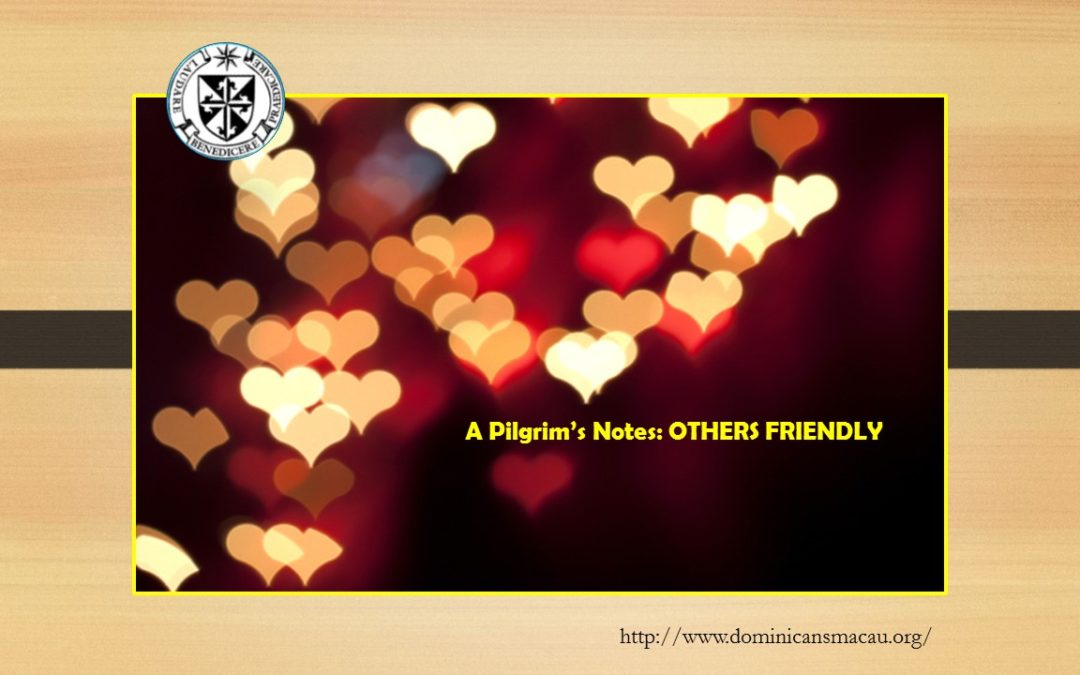
FAUSTO GOMEZ OP
faustogomezb@yahoo.com
    Someone said that “people are not bad; they just suffer.†People – most people – are good, and treat others with kindness and gentleness. Being “others friendly†in our daily life does not make it to the front pages of newspapers or TV news casts, but it is worthwhile to practice: events, experiences, encounters that contribute to make our life meaningful and joyful. Let me share with you a few little stories which happened to me.
    In Macau I take the bus almost daily. I would say that ninety eight per cent of the time someone offers me his or her seat (I am young at heart!). Sometimes, particularly after five in the afternoon I resist, because I see people are tired and my distance home is a few stops only. No way. I remember one time a middle-aged lady offered me her seat. I tell her that I am getting off the next stop. No way: “Please, sit.†Amen – and thanks!
    The following story happened last summer. A young lady offered her seat to me in the Metro or subway of Madrid. As I was sitting, I stepped on the left foot of another young lady. I said thank you to the first and sorry to the second, who did not say a word, but gave me a truly sincere smile. She made my day!
    Another little happening. Some weeks ago, I was waiting for a taxi in Jardim de Flora, Macau. A young man was ahead of me, so he stopped the first taxi that passed by, opened the door and … called me – I was about three meters away from him. He asked me to please get on the taxi. I told him: “Please, you take it. I am in no hurry. I wait for another.†He just smiled at me and showed me the open door with an inviting gesture of his right hand. People are good!
    Once I bought a daily newspaper in a street stand. This time in Madrid. After paying, I said to the man who handed me a copy of the newspaper: “Thank you,†and added: “May you have a good day.†I think he was surprised and reacted late. I was already meters away from him, when he shouted: “Señor, sir, “and you too; may you have a good day.†I still smile when I remember him.
    Three years ago I had a student in Moral and Spiritual Theology. He was an atheist. He came to love the class and the exchanges among the eight students of the class. One of the questions of the final exam was on how they found the class – positive and negative points. This student was happy he enrolled: he learned to read books and present them in class, and, above all, he said he learned something essential for his life: “Though this class is about religions and I do not have beliefs in religions, I believe the essence of all religions is love; therefore this class is also teaching me how to love. Thank you very much.†He opened his answers to the questions of the final exam thus: “Dear professor. Here are my answers. God bless you.†I remember with joy and gratitude my atheist (?) student who asked God to bless me! And I know he meant it.
    I have a friend who is a doctor of medicine and very kind. She answers emails right away. I think she believes that gratitude should not just walk but run – like the Father of the Prodigal Son! The majority of people answer emails or WhatsApp after some minutes or hours or days; some, much later, and a few, almost never, or until one asks them: “Did you receive my email?†I remember Charlie Brown the kind master of Snoopy and friend of Linus and the rest of the Peanuts Family. Before Christmas Charlie sent a Christmas card to all his friends. Some did not answer so he called them up and asked them: “Did you receive my Christmas card?†They answered him: “Yes, thank you very much.†Charlie Brown: “It is good to help people say the right thing.†Did you receive my email?
    A religious sister told me this story. She was given a free trip to Lourdes, France. She was happy. She wanted to ask Our Lady of Lourdes to heal her from her constant pains and aches, especially her crippling arthritis. When she arrived at the Shrine she forgot her petition: “Seeing so many people ill – some very disable, others in wheel chair, others limping, still others crying… -, I did not mind my request.†Instead of praying for herself, she prayed for all those brothers and sisters who went to visit Our Lady in search of a miracle, or just peace of soul. How beautiful! To forget ourselves to connect with others and try to help them. For believers, every person is a brother or a sister in Christ – the Crucified and Risen Christ: God is the Father of all.
    A few years ago I traveled to Matsuyama with another brother Dominican. We had to stop at Osaka Airport. We had time for lunch so, not knowing much of the rich Japanese cuisine, we opted for MacDonald. We checked the different kinds of sandwiches and their corresponding amount in yens. I was greatly surprised by the price of the last item in the list: zero (0). I checked what it was: Smile! I was indeed joyfully surprised – Smile: 0! St. Mother Teresa of Kolkata, who practiced the apostolate of the smile, said: “Perhaps I do not speak your language, but I can smile.â€
    In December of last year (2016), walking on my way to the house of the Missionaries of Charity in Macau, a woman was shouting at my back. I turned around and saw her: she was young, a teen-ager. She kept talking in Chinese and pointing to my cap. I realized she was a bit mentally disable. I made signs trying to tell her if she wanted my cap. She answered moving her head up and down. So I gave it to her. She was so happy. And I was very happy. She made my day – and some more.
    Walking one day with a friend, under the Aqueduct of Segovia, Spain, a middle-aged woman approached us and asked for some money to feed her children. We gave her some amount. Her answer: “Many thanks, and may God give it to you in another way.†That was wonderful and true: Jesus pays well, St. Teresa of Avila says. I remember the words of St. Peter Chrysologus: “Give to the poor and you give to yourself.â€
    The icon of kindness, compassion and tenderness is the mother, our mother. Best images are mother and child, or mother (grandmother) and father (grandfather). I remember the words of St. John of Avila: “The most beautiful thing in the world is to see in Bethlehem a young woman with her child in her arms.†What a joy for me to watch the little children going to school with their parents and or grandparents: some parents talk with their children, others listen to them, and still others just smile to each other. So much love and tenderness and joy! I thought: the future in in good hands. With these uplifting images, one understand better what Jesus says: “Let the children come to me… If you do not become like children you will not enter the Kingdom of heaven.â€
    When I see a needy person, the following well-known story comes to my mind. There was a little girl – hungry, dirty, fragile, poor – shivering in a cold winter morning. A priest passed by and felt some kind of pity for her. So at night before going to bed, the priest asked God: “Why don’t you do something about the little girl, your child?†He asked the same question for a few nights in a row. God kept silent. Finally, one night God answered him: “I did something. I created you.†There are many in our world like the little girl, perhaps not far from us, who need an act of kindness, a piece of bread, a smile. I am sure of this: we will never regret helping some needy children, women, and men.
    Little acts of kindness, or courtesy to others enrich us all. Courtesy, St. Francis of Assisi tells us, is the little sister of charity or love. St. Therese of the Child Jesus invites us to practice her “little way of love, not to miss out on a kind word, a smile, or any small gesture which sows peace and friendship†(Pope Francis). These little acts of love, of courtesy, of kindness and gentleness are truly refreshing for the giver and the receiver.
(Published by O Clarim, The Macau Catholic Weekly: May 12, 2017)
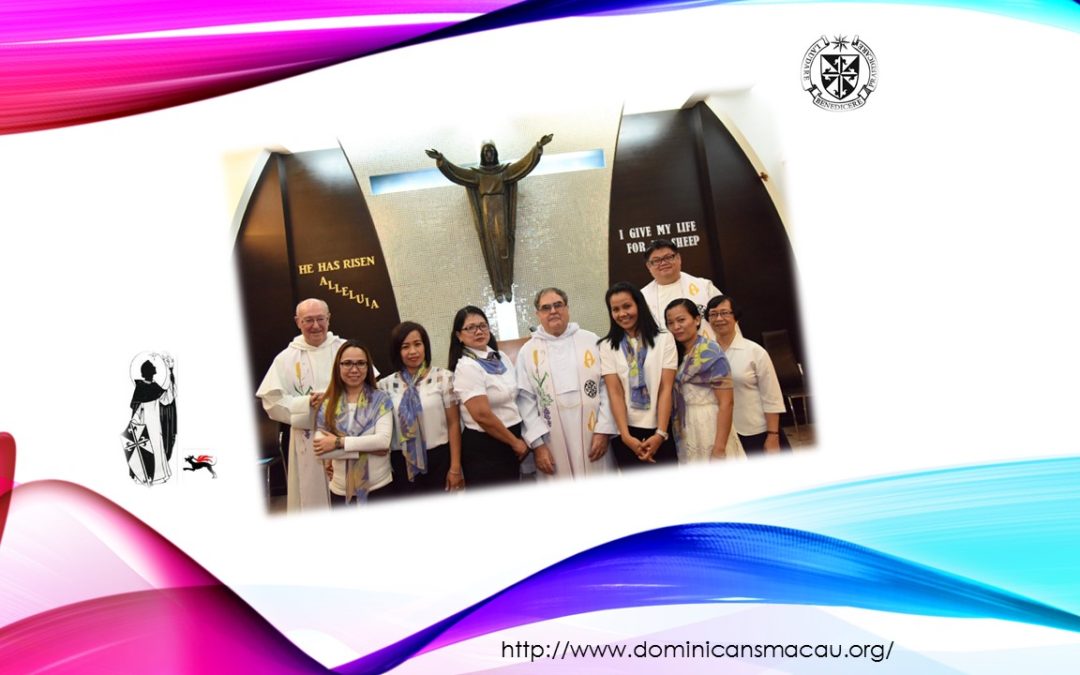
ENGLISH:
The first group of members of the Lay Fraternity of Saint Dominic “Antorcha de Macau” made their first commitment last 7 May, 2017, which was Vocation Sunday.
Fr. Provincial received their promises during a simple ceremony at the Priory Chapel in the presence of close friends as well as Fr. Jose Luis de Miguel, Prior of S. Dominic’s, Fr. Jarvis Sy, the Spiritual Director and Sister Maria Lourdes Blanca of the Misioneras Dominicas del Rosario, the animator and spiritual adviser.
The members who made their commitment are: Sisters Francisca Anna Guzman, Francia Guzman, Rosie Pae Alcantara, Miriam Zingapan and Selina Ebora. Another member, Sister Anne Marie Paroy made the commitment a few days earlier as she had to return to the Philippines.
The act of commitment culminated the long years of preparation and formation to consolidate the group and to make it relevant in the Church and Society of Macau. The fraternity was established by Fr. Provincial on the occasion of the Jubilee of the Order last year 1 May, 2016 hoping that it would be a tool for evangelization and the deepening of the faith for the members.
​
​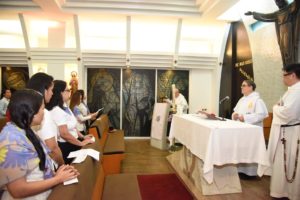  Â
  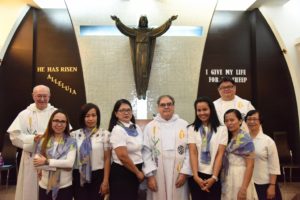  Â
  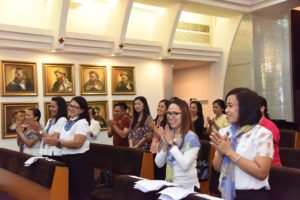
​
ESPAÑOL:​
El primer grupo de la Fraternidad Dominicana de Santo Domingo “Antorcha de Macao” hizo sus promesas el pasado 7 de mayo, domingo de las Vocaciones.
El Prior Provincial recibió dichas promesas durante una sencilla ceremonia en la capilla de nuestro Convento de Santo Domingo en Macao, en presencia de algunos amigos (futuros miembros) y de los Padres Jose Luis de Miguel (Prior del Convento de Santo Domingo), de Fr. Jarvis Sy, Director Espiritual de la Fraternidad, y de la Hermana Maria Lourdes Blanca, de las Misioneras Dominicas del Rosario, que es la animadora y alma del grupo.
​Quienes hicieron las promesas fueron las siguientes Hermanas: Francisca Anna Guzman, Francia Guzman, Rosie Pae Alcantara, Miriam Zingapan and Selina Ebora. ​Otra, Anne Marie Paroy ​habÃa hecho la promesa unos dÃas antes porque tuvo que volver a Filipinas.
La celebración fue el colofón de varios años de preparación y de formación para consolidar el grupo and hacerlo significativo en la Iglesia y en la Sociedad de Macao. La Fraternidad fue establecida por el Prior Proivncial con motivo del Jubileo de la Orden el año pasado, el dÃa 1 de mayo, con la esperanza de que sea un instrumento de evangelización y de profundización de la fe en sus miembros.
Fray Fernando, O.P.
Secretario Provincial
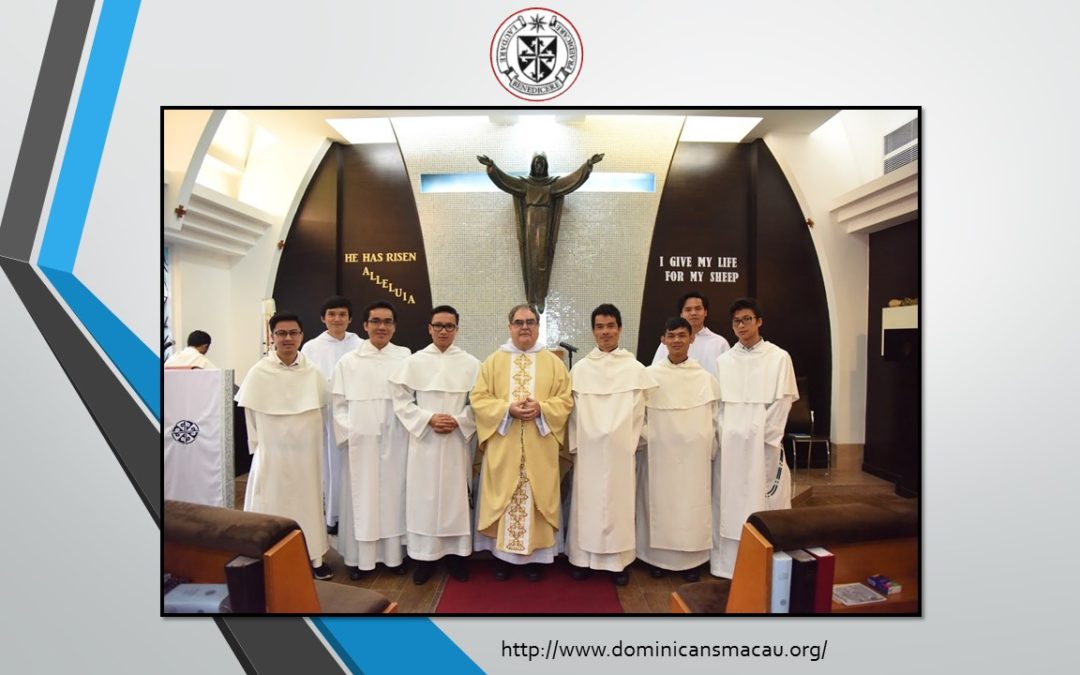
El dÃa 8 de mayo, 2017, en la memoria del patrocinio de la Bienaventurada Virgen MarÃa sobre la Orden de Predicadores, el Prior Provincial presidió la Misa conventual en el Convento de Santo Domingo en Macao y dió los Ministerios de Lector y de Acólito a varios de nuestros estudiantes.
On 8 May, 2017, the memoria of the patronage of the BVM over the Dominican Order, Fr Provincial presided at the Conventual mass at Saint Dominic Priory Macau and instituted the ministries of Lector and Acolyte to some of the student brothers.
ACÓLITOS / ACOYTES: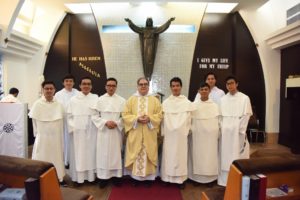
Bro​.  Ignatius Ngo Van Thu Giang, OP
Bro​.  Francis Nge Nge, OP
Bro​.  Francis Naw San, OP
Bro​.  Peter Zya Reh, OP
​LECTORES / LECTORS: 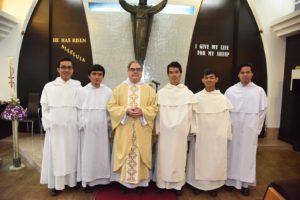
Bro​.  Stephen Saw Lej Kapaw Htoo, OP
Bro​.  Markho Thoe Reh, OP
Bro​.  San Ti No, OP
Bro​.  Francis Bu Ling, OP
Fray Fernando, O.P.
Secretario Provincial
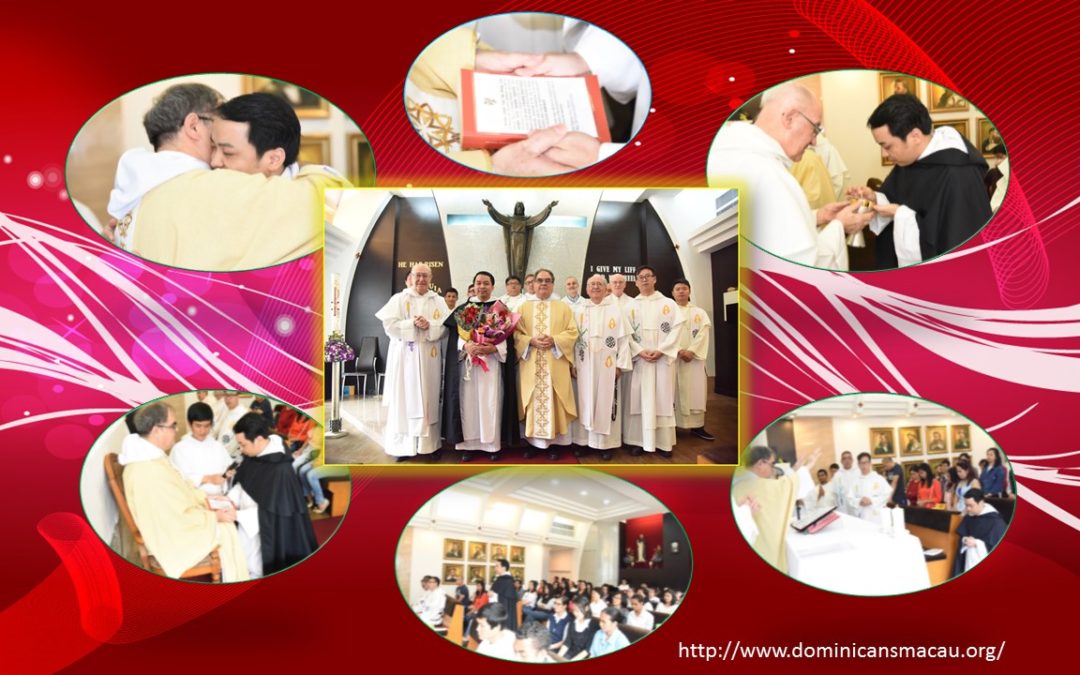
On the occasion of Good Shepherd Sunday (7 May, 2017) Saint Dominic Priory in Macau witnessed the solemn profession of our Brother Joseph Tran Van Huong during the Sunday Mass presided by Fr. Provincial.
Among those who attended the celebration were the Fathers from the communities of Saint Joseph House and Saint Albert Priory, in Hong Kong, professors from the University of Saint Joseph, the Dominican family and friends of the community.
A good representation from the local Vietnamese community was also present during the liturgical event.
Although the profession ceremony was simple, its solemnity was not diminished despite the space; and was further enhanced by the beautiful songs and tasteful selections of the repertoire during the Mass. At the end Brother Joseph had some beautiful words of gratitude.
After the celebration, a simple agape was prepared at the social hall the all the friars, sisters, and guests in attendance.
 
Coincidiendo con el Domingo del Buen Pastor (7 de mayo, 2017) nuestro convento de Santo Domingo en Macao fue testigo de la profesión solemne de nuestro hermano vietnamita Joseph Tran Van Huong, durante la Misa presidida por el Prior Provincial.
Entre los presentes en la celebración estaban los Padres de las comunidades de San José y de San Alberto, de Hong Kong, algunos profesores de la Universidad de San José, la Familia dominicana y amigos de la comunidad.
También estaba presente en la celebración una buena representación de la comunidad vietnamita local.
Aunque la ceremonia de la profesión fue sencilla, sin embargo, su solemnidad estuvo enmarcada dentro de la Misa por la buena selección de canciones hecha por nuestros estudiantes. Al final, fray Joseph tuvo unas bonitas palabras de agradecimiento, con un recuerdo especial para sus padres.
Después de la celebración, hubo un ágape en la casa al que asistieron todos los asistentes a la Misa, los hermanos y las hermanas dominicas.
ENHORABUENA A NUESTRO HERMANO JOSÉ.




 Â Â
    Â
  




